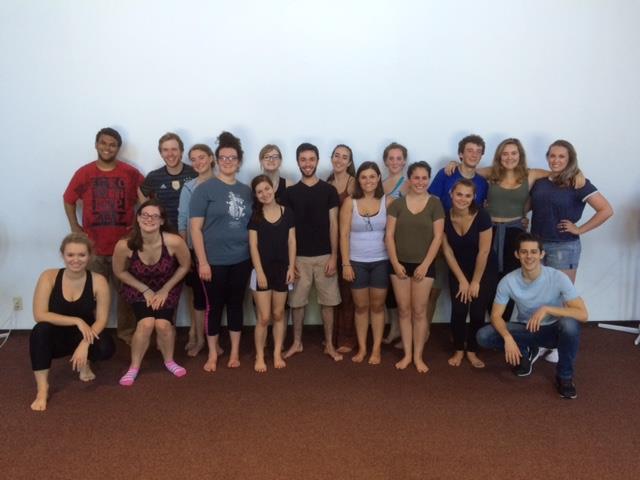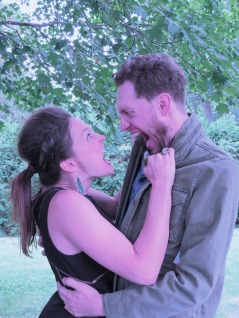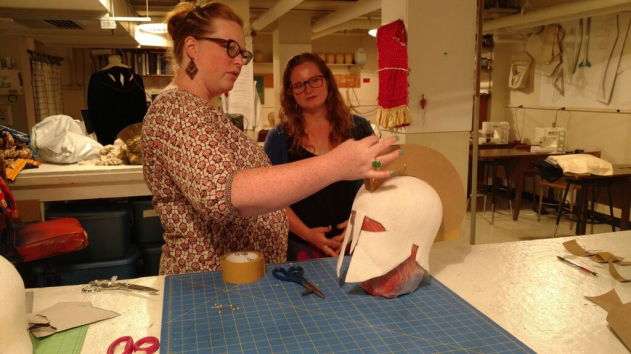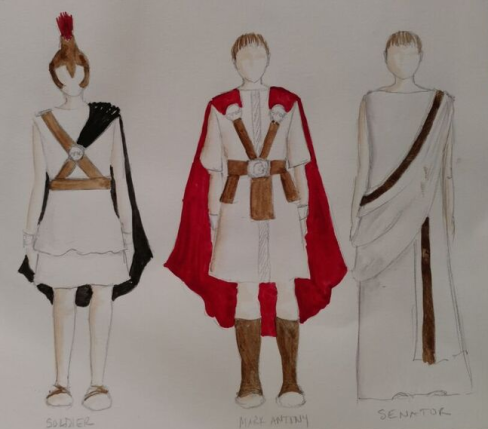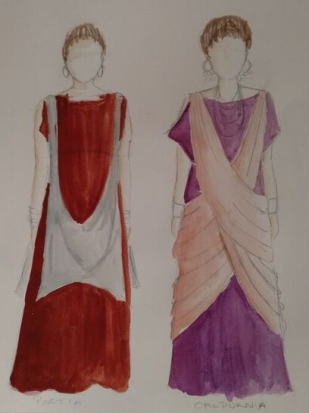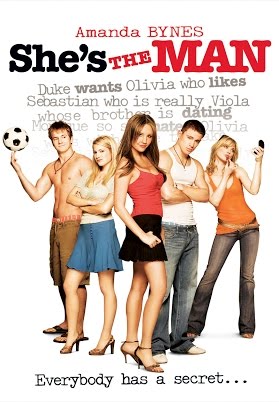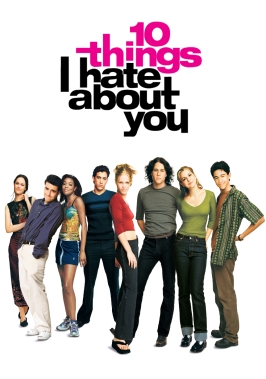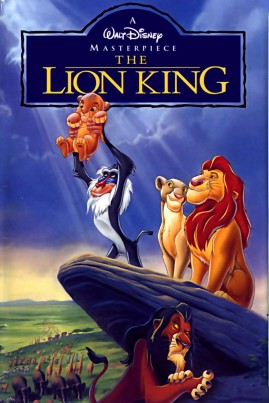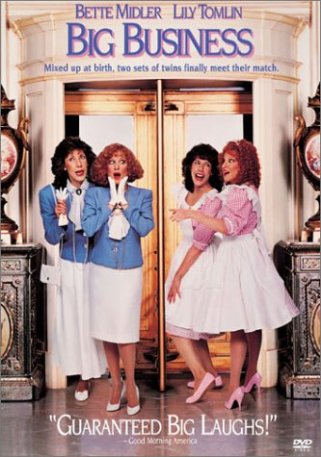Read on to learn all about the assistant director to Julius Caesar and the director of the Summer Training Institute’s Macbeth Project: Nick Piacente.
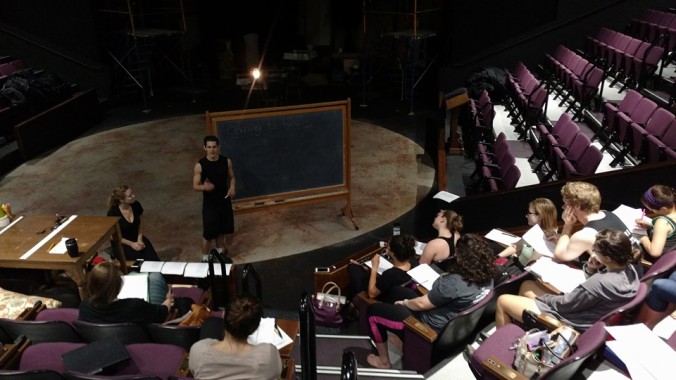
What is your background with theater?
I have a B.F.A. in Drama from NYU studying specifically at the Stella Adler Studio of Acting. I’ve been acting in NY and regionally throughout the U.S. since graduation. My first show in high school was Arsenic and Old Lace and I played Teddy Brewster. It was a play and role that hooked me in for the comedy and huge amount of fun I had. The movie with Cary Grant happened to be one of my favorite movies because I thought the physical comedy was outstanding. Physicality in comedy is what first drew me towards the stage.
I’ve been a part of Vermont Shakespeare Festival for the past 4 years playing various roles such as Ferdinand, Puck, and Romeo for the company. Currently, I teach Movement for Actors at Stella Adler Studio where Jena Necrason (the Artistic Director of VSF) is Head of Movement. I was the assistant director of Julius Caesar and the director of the Summer Training Institute’s Macbeth Project. So at this point in my career, like many other artists, I feel as if I’m becoming a jack of all trades. I’m an actor, a teacher, and a director.
How long has the Summer Training Institute been going on for?
Jena and John have made nurturing and inspiring young artists an essential goal of the company. The Summer Training Institute was launched in 2010 after the company had been going for 5 years. Initially, it was referred to as the “Vermont Shakespeare Intern Program”. The program offered a number of young Vermont students the opportunity to receive professional training by actors in the company in return for working on the production. Classes included Monologue Coaching, Scene Study, Movement, Physical Acting, and Voice and Speech. The program has grown every year and this past season, it became a fully-developed 4 week program featuring daily classes, master classes with company members, positional crew designation based on your preferred area of focus (lights, sound, costumes, props), and a performance of a show created and designed by the interns. This year, it was one-hour production of Macbeth.
Can you tell us about the curriculum and how you came to plan it?
The curriculum is based off my time as a student and teacher at Stella Adler. I felt it was very important to give the students that joined us the very best professional training we could offer so that could learn more about who they are as a person and as a budding artist. Creating a daily schedule of classes was necessary to deepen the techniques and offer more opportunities for personal exploration. Based off of a conservatory model, each morning would feature two classes (Movement/Acting Technique, Voice and Speech/Text Analysis, Movement and Voice/Business of Acting) and the afternoon would be rehearsal for the “Macbeth Project”. Fridays, would be a master class of Physical Acting or Stage Combat in the morning and Macbeth Project in the afternoon. This would be the flow for the first two weeks of the program.
At night, the students would watch rehearsal of the main stage production of Julius Caesar. This observation fulfilled a few goals. It gave students a sense of how all these techniques and teachings are applied in the rehearsal room on a professional level, it was an opportunity to watch professional actors work and see the in’s and out’s of creating theatre, and gave them an opportunity to learn about the show they would eventually crew and support for the remaining two weeks. After the first two weeks are finished, the program dives into more hands-on work on the main stage production of Julius Caesar. This is when students really can explore a particular area of theatrical focus: lights, sound, costume, stage management, and run crew. During these last two weeks, class time is limited, but Macbeth Project rehearsal and tech/performance of Julius Caesar are the main focus.
Also, it’s crucial to mention though although this program is extremely beneficial for the actor, it’s a growing place for every type of artist. Our young artists work right beside our designers. If you are interested in costuming, you design clothing for the main show. If you are interested in lights, you might run the light board for every performance. If you are interested in sound design, you might run sound for every performance. Also, these design elements are incorporated into the Macbeth Project, so that everything you learn is applied immediately. The Summer Training Institute is designed to foster any young artists’ desire and even just help you find what that desire is.
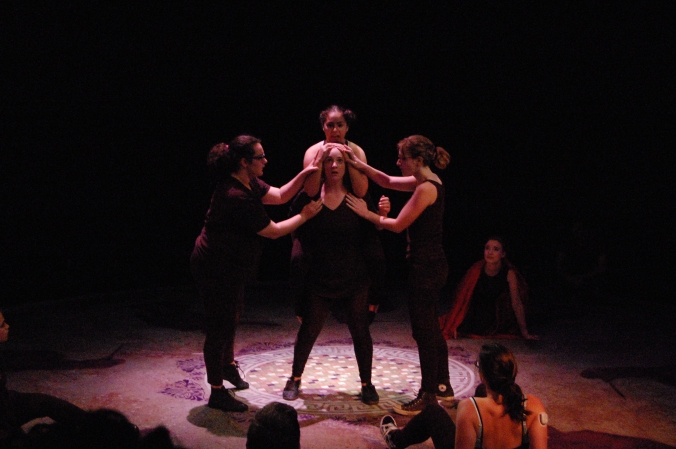
Can you tell us about the Macbeth Project?
The Macbeth Project is an opportunity for the young artists of our program to put the skills they have learned in class and developed together over the course of their time with us to actual theatrical application. The script was cut down to a one-hour length. I wanted our artists to begin to form an artistic process to their work. I wanted our artists to find the joy in Shakespeare and physical theater. I wanted our artists to collaborate to create something meaningful and magical. I believe theatre should be hard and fast. It should hit you in the face. It should rattle you, shock you, and even scare you. It should be a cathartic experience.
As the director, I encouraged our young artists to push the boundaries of their body, voice, and comfort zone to make physical, visceral, fun theatre. I also wanted them to get a sense that powerful theatre can be created with a bunch of voices in a room and one red prop blanket. Which is all we had. One prop. I had people bring in musical instruments from home. We staged it so everyone was onstage the whole time. There was singing, rapping, chanting, lifts, dancing, and creative movement pieces. My background is as a mover. So I wanted this piece to move and take the audience on a ride. I believe everyone had a great and hopefully, memorable experience.
What have you enjoyed most about teaching the program?
Human beings fascinate me. They surprise me every day. We can surprise ourselves. It’s why I love being a teacher. Seeing a person realize something about their body or their voice or that they can do something they never thought they could…is magical. It’s amazing. I felt like by the end of the 4 week program, I saw 13 different people. Also, the relationships you form truly are life-changing. I do not doubt that for some of our younger artists, this will be their life-changing theatrical experience. This will be their Arsenic and Old Lace.
What criteria did you use to select applicants for the Summer Training Institute?
We received a ton of applications this year. We accepted 13 high school and college students from all over the country into the Training Institute this summer. I’m attracted to an applicant that is hard-working, adventurous, has a love of Shakespeare, a fun attitude, and has a desire to have a challenging but rewarding 4-week experience. And to be honest, you can see all that in the first second they walk in the room or by their voice on the phone. Do you want it? If you do and you know you do, there is a good chance we want you too.
Anything else you’d like to add?
I cannot speak highly enough about what I learn from the applicants we have every year. It’s a learning process for everyone involved at VSF. I hope I can continue the amazing relationships I’ve formed with each and every one of them. And VSF, we will always be by their side. For recommendations, life advice, or a simple hello. We are committed to establishing VSF as a family. And if you are a part of our program, you are always a part of that family.
